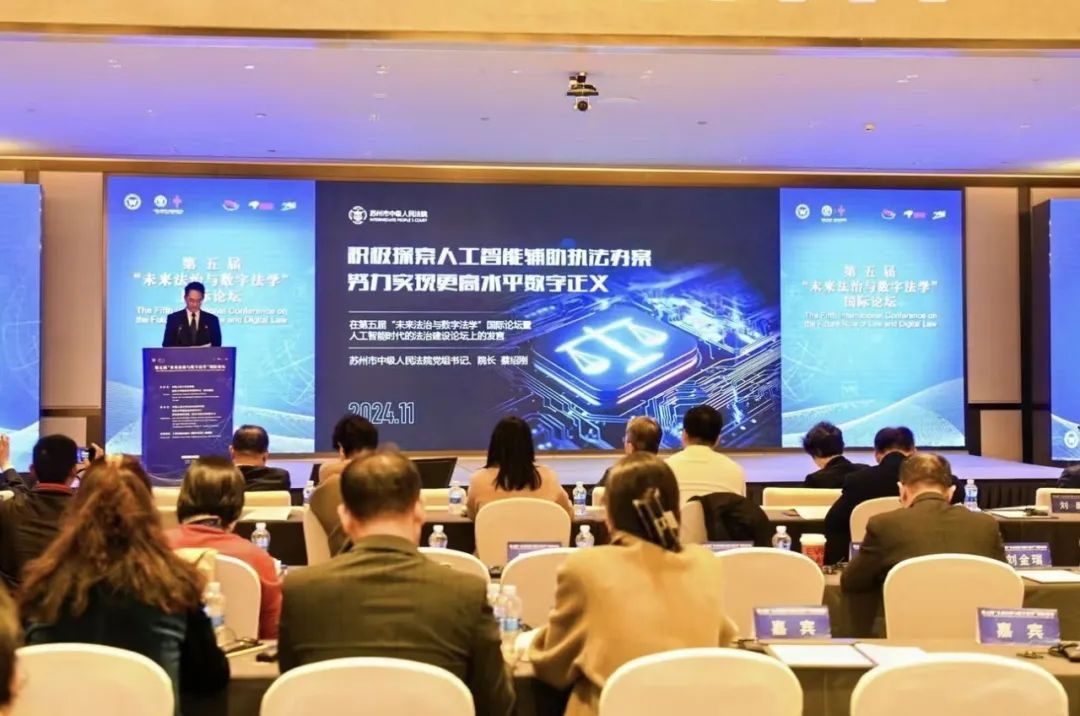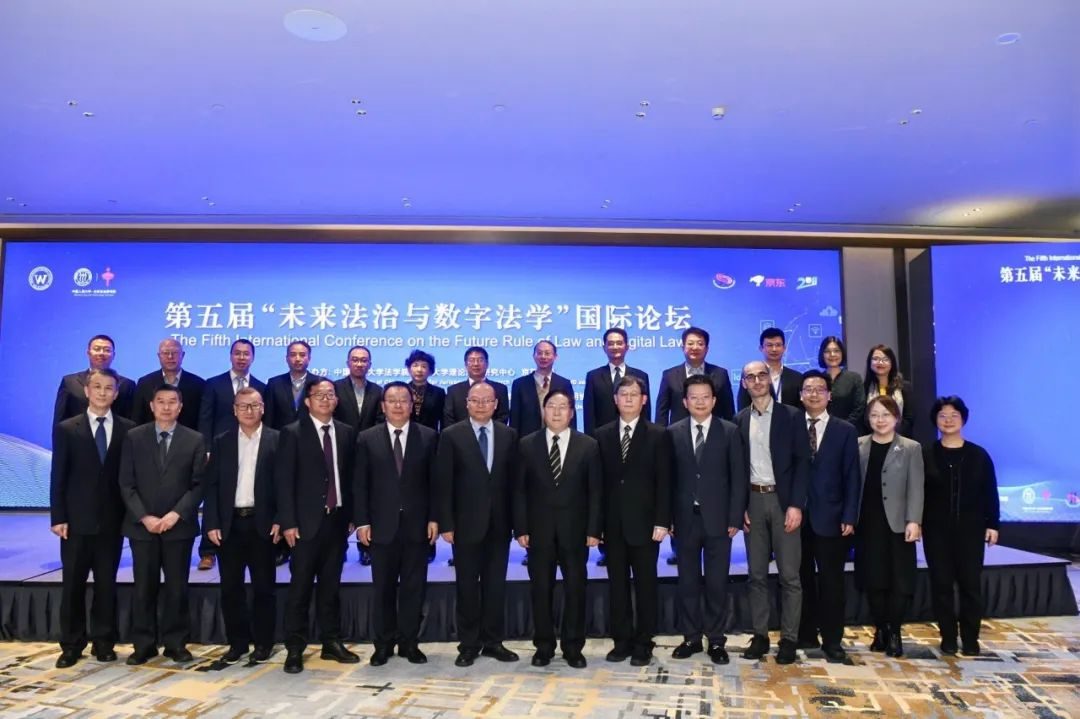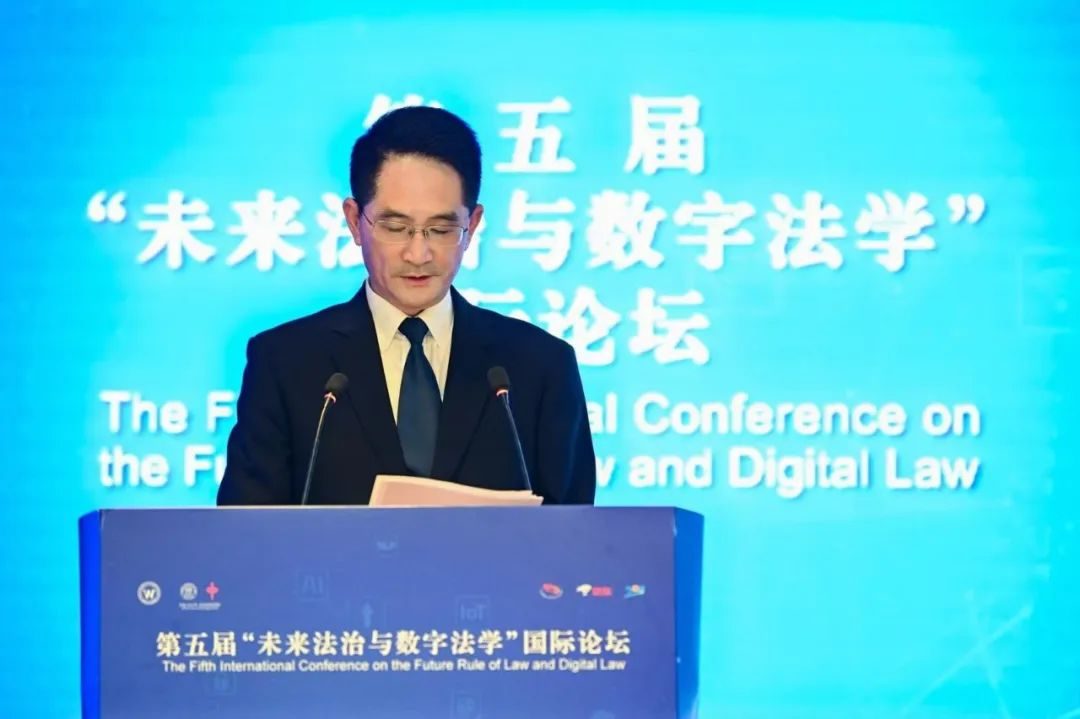
From November 2 to 3, the 5th "Future Rule of Law and Digital Law" International Forum and the Rule of Law Construction Forum in the Artificial Intelligence Era were held in Beijing, hosted by the Law School of Renmin University of China, the Theoretical Legal Research Center of Jilin University, and JD.com. Jiang Wei, Vice President of the China Law Society, President of the Network and Information Law Research Association of the China Law Society, Deputy Chairman of the Advisory Committee of the Supreme People's Court, Zheng Shuiquan, Deputy Secretary of the Party Committee of Renmin University of China, Han Xiping, Deputy Secretary of the Party Committee and Professor of Jilin University, JD.com Hu Huangang, Vice President of the Group, and Wang Yi, Deputy Secretary of the Party Committee, President and Professor of the People's Public Security University of China, attended the forum and delivered speeches. Huang Wenyi, professor at the Law School of Renmin University of China and editor-in-chief of "Chinese Law" magazine, presided over the opening ceremony.

The future exploration of the rule of law and digital legal research are important missions and responsibilities in the field of law under the dual strategic framework of the construction of digital China and the construction of rule of law China. The forum is convened to further promote research in the fields of future rule of law and digital law, strengthen international exchanges and cooperation in the fields of future rule of law and digital law, and make positive contributions to the high-quality development of the global digital economy. The forum invited well-known experts and scholars at home and abroad, leaders of government agencies, famous judges and industry representatives to participate in the forum to discuss and build consensus, discuss multi-dimensional legal propositions and innovations in the fields of future rule of law and digital law, and contribute to social development.
Zhang Wenxian, member of the Party Committee of the China Law Society, director of the Academic Committee, senior professor of philosophy and social sciences at Jilin University, Wang Liming, vice president of the China Law Society, president of the Civil Law Research Association of the China Law Society, first-class professor at Renmin University of China, and knowledge from Queen's University School of Law Professor of Property and Technology Law, Global Intellectual Property and Technology Center Director Giancarlo Frosio, Vice President and Professor of China University of Political Science and Law, Director of the Data Rule of Law Laboratory and Dean of the Data Rule of Law Research Institute Shi Jianzhong, Member of the Standing Committee of the Party Committee, Vice President and Professor of Law School of the University of International Business and Economics Mei Xiaying , Song Jianli, deputy director of the Intellectual Property Procuratorial Office of the Supreme People's Procuratorate, was invited to attend and deliver a speech.
In the "Dean's Forum" session, Cai Shaogang, Secretary of the Party Leadership Group and Dean of the Suzhou Intermediate People's Court of Jiangsu Province, Guo Li, Secretary of the Party Committee and Dean of Peking University Law School, Yin Fei, Dean and Professor of the Law School of Central University of Finance and Economics, and Kai Li of Shanghai Jiao Tong University Peng Chengcheng, former dean, professor and director of the Data Law Research Center of the Law School, Fan Chuang, deputy director of the Trial and Management Office (Research Office) of the Xicheng District People's Court of Beijing, and Yang Dejia, president of the Intellectual Property Division of the Beijing Haidian District People's Court, focused on the rule of law in the digital age They made exchange speeches on construction-related topics. Yang Dong, Dean and Professor of the Law School of Renmin University of China, and Song Yushui, Vice President and Director of the Political Department of the Beijing Intellectual Property Court, co-hosted and participated in the discussion.

At the forum, Cai Shaogang gave a speech titled "Actively exploring artificial intelligence-assisted law enforcement and case handling to achieve a higher level of digital justice." He pointed out that with the vigorous development of the digital society and the rapid rise of artificial intelligence, the deep integration of artificial intelligence and judicial trials has become a reality and a general trend, providing a strong impetus for the modernization of trial work. There is a certain degree of reality, necessity and feasibility in the Suzhou Court's use of artificial intelligence to assist judicial handling of cases. Since 2016, Suzhou Court has built the "Suzhou Model" for smart trials and the "Thousand Lights Plan" for paperless case handling, which mainly focuses on "dossier generation + online case handling + intelligent services". Related achievements won the first People's Court Reform and Innovation Award, etc. honor. Since last year, Suzhou Court has accelerated the in-depth integration of artificial intelligence and judicial work on the basis of full-process paperless case handling. Focusing on the two focuses of intelligent assisted review and legal document generation, it has built the country's first judicial artificial intelligence system that can fully analyze case data. Based on this large intelligent model, we developed and launched the "Future Judge Assistant" - a judicial artificial intelligence assisted case handling system. At present, 42 categories of first- and second-instance auxiliary trial model capacity training and development have been completed, covering approximately 150,000 cases in the city's courts throughout the year, forming a complete process that integrates pre-litigation mediation, judicial trials, etc., covering auxiliary case handling, transaction intensive, Judicial application scenarios in multiple fields such as risk prevention and control and convenient litigation have effectively improved the effectiveness of artificial intelligence judicial applications and effectively promoted the modernization of the trial system and trial capabilities.
The first is to inject new momentum into law enforcement and case handling. The system has functions such as intelligent electronic review, intelligent question and answer on case information, and one-click generation of legal documents, which greatly reduces the judges' administrative work. From January to October this year, 653 judges and judge assistants in Suzhou Court used the system to handle 112,000 cases. On average, they completed 479 intelligent review cases, generated 70 legal documents with one click, and answered 80 questions and answers with AI assistants every working day. The burden on judges' administrative work has been significantly reduced, and the time for reviewing papers and writing judgment documents has been shortened by about half. The judges' satisfaction rate with the system's functions has exceeded 96%. Judging from the trial quality management indicator system, from January to September this year, efficiency indicators such as the case closure rate within the trial limit and cases outstanding for more than 12 months in the city's courts tended to be better than the same period last year, and were better than the reference range set by the Supreme People's Court. At the same time, relevant functions are embedded into the pre-litigation mediation platform to assist mediators in electronic review and other tasks, effectively improving the quality and efficiency of pre-litigation mediation work.
The second is to develop new paths for judicial management. The system can conduct intensive management of the main trial process nodes such as case scheduling, delivery, and settlement, realize automatic early warning prompts, dynamic monitoring, and online traces of overdue situations, and realize online monitoring of the entire case handling process. Real-time monitoring and intelligent early warning of the quality and effectiveness of pre-litigation mediation have improved the level of precision and refinement of judicial management. For example, the Kunshan Municipal People's Court independently developed a digital trial management system with the trial auxiliary affairs intensive system, trial process node management system and three-level quality and efficiency dynamic management system as the core to continuously improve the accuracy and timeliness of management and services.
The third is to provide new tools for social governance. AI large models can be used to conduct in-depth correlation analysis of judicial big data, provide early warning prompts for matched and captured multi-department data, and issue targeted risk warnings and countermeasure suggestions to relevant units to help prevent and control social risks. For example, the Suzhou Intermediate People's Court used judicial big data to build the "Suzhou Social Governance Judicial Index Platform", which can accurately analyze the characteristics and causes of conflicts and disputes in specific regions, fields, and enterprises, and effectively assist party committees and governments in scientific decision-making. The Zhangjiagang Municipal People's Court has developed and applied a big data social situation and public opinion sensing interactive platform. Through the analysis and summary of social conditions and public opinion, it can provide reference for dispute resolution and risk prevention and control.
The fourth is to build a new platform for judicial services. Focus on providing parties with online and offline integration, covering one-stop, all-round and multi-dimensional litigation services before, during and after litigation, so as to make the results of digital court construction more fair and popular. Develop and upgrade the AI intelligent legal assistant "Sufa Xiaorong", and connect it with Suzhou City's "Sushangtong" and "Suzhoudao" platforms for market entities and the general public, to provide parties and the people with intelligent legal business consulting, AI Judicial case push and other services. On May 8 this year, the Suzhou Intermediate People's Court and the ten grassroots people's courts in the jurisdiction all set up judicial service centers to assist enterprises in developing enterprises, and simultaneously launched intelligent legal service assistants. Since its launch, it has provided 82,000 online consultation and inquiry services to parties people.
Cai Shaogang said that generative artificial intelligence technology is accelerating its evolution and is becoming an important engine for the development of new productivity. The integration of artificial intelligence and judicial trial work will have greater room for development. In the next step, Suzhou Court will further seize opportunities, continue to expand new judicial artificial intelligence application scenarios with future judge assistants as the core, continue to improve the level of judicial capabilities that serve the overall situation and serve the people, and strive to create a "Suzhou model" for judicial artificial intelligence applications. , Contribute more judicial power to promote the construction of a digital society and a society ruled by law.
The first is to continuously improve the general capabilities of the system. Strengthen data integration and collaboration among the five professional courts of the Suzhou Court, analyze, summarize, and refine different legal reasoning models based on the characteristics of different types of cases. Through continuous optimization and improvement of legal reasoning models, and continuous improvement of system logical thinking capabilities, we can effectively improve artificial intelligence Accuracy and reliability of answers from intelligent systems. Continue to strengthen the training of system information collection and processing capabilities, so that the system can perform precise matching through keyword search from big data such as laws and regulations judicial interpretation database, case database, judgment document database, etc., and provide rich data resources for front-line judges to handle cases.
The second is to upgrade and create a full-scenario future judge assistant. Effectively link the AI large model with asynchronous trials and pre-litigation mediation to create a "judge digital assistant" that can automatically collect and summarize case litigation materials, automatically summarize the focus of disputes, and automatically complete pre-trial cross-examination and other tasks. The AI large model is combined with the judge's daily affairs management to create a "judge digital secretary" that can automatically arrange work schedules, automatically analyze and prompt trial data, and automatically connect with the auxiliary case handling team to provide judges with a full range of auxiliary affairs services. Combining AI large models with big data analysis systems creates "trial data analysts" who can automatically analyze all case data and provide comprehensive data-type case retrieval, comparison, and statistical services.
The third is to further strengthen the construction of safe operation mechanisms. Advanced information security technologies such as data encryption, access control, and audit tracking are used to build a comprehensive and multi-level data security barrier to effectively prevent risks such as data leakage and tampering, and ensure the integrity and authenticity of trial data. Strengthen supervision of the entire process of artificial intelligence judicial application, ensure timely identification of algorithm loopholes, avoid risks, and ensure the controllability and credibility of artificial intelligence-assisted judgment results. Provide legal protection for the application of artificial intelligence technology in the judicial field by participating in the formulation of industry standards and policy recommendations.
The fourth is to strive to create a team of composite judges who are both proficient in law and familiar with technology. Strengthen the selection and utilization of comprehensive talents, and strive to ensure that more judges not only have profound attainments in the legal field, but also have in-depth understanding and application capabilities of emerging technologies, and can handle digital judicial issues in the context of globalization, so as to better We must fully adapt to the development needs of the AI intelligent era and effectively use a higher level of digital justice to better meet the people’s new needs and expectations for fairness and justice.
Zhao Haisheng, full-time member of the Adjudication Committee of Suzhou Intermediate People's Court and director of the Trial and Management Office; Wu Wanjiang, Secretary of the Party Leadership Group and President of the People's Court of Huqiu District, Suzhou City; Wu Hong, Deputy Secretary of the Party Leadership Group and Vice President of Suzhou Intermediate People's Court; and relevant responsible comrades of the Science and Information Department and Research Office of Suzhou Intermediate People's Court. Participate in forums.